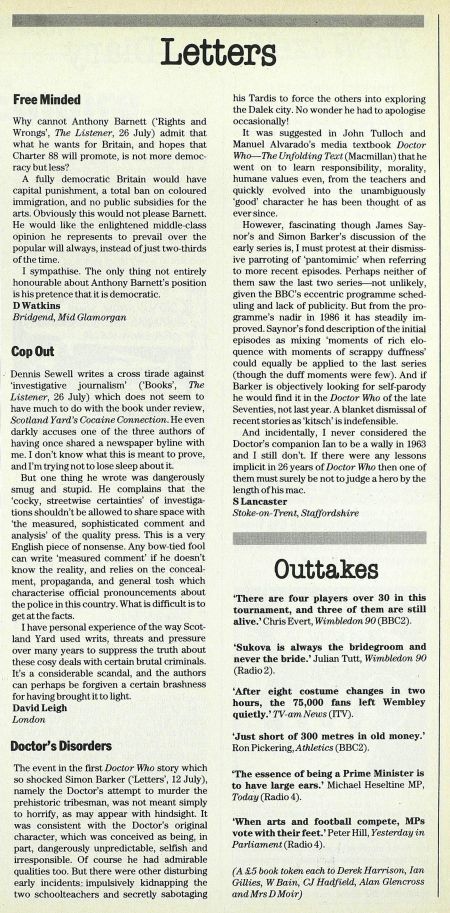Doctor's Disorders
- Publication: The Listener
- Date: 1990-08-09
- Author:
- Page: 23
- Language: English
The event in the first Doctor Who story which so shocked Simon Barker ('letters', 12 July), namely the Doctor's attempt to murder the prehistoric tribesman, was not meant simply to horrify, as may appear with hindsight. It was consistent with the Doctor's original character, which was conceived as being, in part, dangerously unpredictable, selfish and irresponsible. Of course he had admirable qualities too. But there were other disturbing early incidents.: impulsively kidnapping the two schoolteachers and secretly sabotaging his Tardis to force the others into exploring the Dalek city. No wonder he had to apologise occasionally!
It was suggested in John Tulloch and Manuel Alvarado's media textbook Doctor Who—The Unfolding Text (Macmillan) that he went on to learn responsibility, morality, humane values even, from the teachers and quickly evolved into the unambiguously 'good' character he has been thought of as ever since.
However, fascinating though James Saynor's and Simon Barker's discussion of the early series is, I must protest at their dismissive parroting of 'pantomimic' when referring to more recent episodes. Perhaps neither of them saw the last two series—not unlikely, given the BBC's eccentric programme scheduling and lack of publicity. But from the programme's nadir in 1986 it has steadily improved. Saynor's fond description of the initial episodes as mixing 'moments of rich eloquence with moments of scrappy duffness' could equally be applied to the last series. (though the duff moments were few). And if Barker is objectively looking for self-parody he would find it in the Doctor Who of the late Seventies, not last year. A blanket dismissal of recent stories as 'kitsch' is indefensible.
And incidentally, I never considered the Doctor's companion Ian to be a wally in 1963 and I still don't. If there were any lessons implicit in 26 years of Doctor Who then one of them must surely be not to judge a hero by the length of his mac.
S Lancaster
Stoke-on-Trent, Staffordshire
Disclaimer: These citations are created on-the-fly using primitive parsing techniques. You should double-check all citations. Send feedback to whovian@cuttingsarchive.org
- APA 6th ed.: (1990-08-09). Doctor's Disorders. The Listener p. 23.
- MLA 7th ed.: "Doctor's Disorders." The Listener [add city] 1990-08-09, 23. Print.
- Chicago 15th ed.: "Doctor's Disorders." The Listener, edition, sec., 1990-08-09
- Turabian: "Doctor's Disorders." The Listener, 1990-08-09, section, 23 edition.
- Wikipedia (this article): <ref>{{cite news| title=Doctor's Disorders | url=http://cuttingsarchive.org/index.php/Doctor%27s_Disorders | work=The Listener | pages=23 | date=1990-08-09 | via=Doctor Who Cuttings Archive | accessdate=19 April 2024 }}</ref>
- Wikipedia (this page): <ref>{{cite web | title=Doctor's Disorders | url=http://cuttingsarchive.org/index.php/Doctor%27s_Disorders | work=Doctor Who Cuttings Archive | accessdate=19 April 2024}}</ref>
